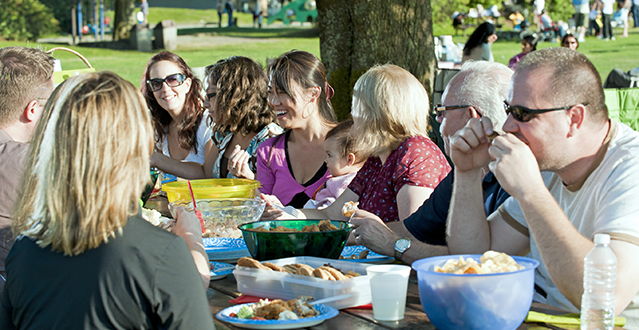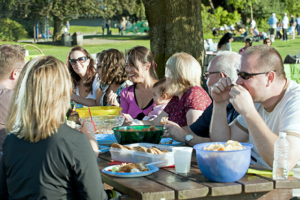

Eating outdoors is a great way to make the best of Australia’s great climate. But eating outdoors increases the risk of food poisoning for a number of reasons. For example, your food will be stored in a cooler such as an esky. This makes it much more difficult to maintain a safe food storage temperature of 5°C or below.
Follow these tips to make sure your fun day out doesn’t turn into a nightmare
Chill
Remember the simple rule for food safety; keep hot foods hot and cold foods cold. Put all perishable foods in a cooler when travelling.
Don’t pack food for a picnic if it has just been cooked and is still warm. Coolers cannot cool food enough to prevent bacteria growing. Always cover pre-prepared foods securely and keep in the refrigerator overnight. Other perishable foods and drinks, such as deli products, cooked chicken and dairy products must also be cold when put in the cooler.
Always pack plenty of frozen bricks or gel packs around the food. Frozen drinks thaw quickly in warm weather and serve as extra cool bricks. Wicker baskets, unless they are insulated, are best used for non-perishables and your other picnic needs.
Avoid keeping perishables such as salads, quiches and cold meats out of the fridge for longer than 4 hours before eating. If you expect to return leftovers to the fridge they should be left out for no more than 2 hours.
Separate
Meat juices can easily leak onto pre-prepared foods, so pack with this in mind and put the meat in leak proof containers on the bottom of the cooler away from ready-to-eat food.
Cut meat into serving-size pieces before leaving home and have all salads ready to eat. This reduces the need to handle foods, particularly when there are no hand-washing facilities.
Use a clean plate and clean utensils for cooked meat. Never re-use the same ones you used for the raw meat without washing them.
Clean
Carry disposable wipes or alcohol based hand gel in case there is no water for hand washing.
Don’t put food directly on picnic tables as they are not always clean so use clean plates or trays.
Cook
Remember sausages, hamburgers and poultry need to be cooked all the way through – use a meat thermometer to check they have reached 75°C in the centre. Steaks, chops and whole pieces of meat should be cooked to 63 °C (medium rare) using a meat thermometer and left to stand for 3 minutes to kill any bacteria and parasites such as Toxoplasma gonddii. As a guide: well done is 77°C, medium 71°C and medium rare 63 °C (leave to rest for 3 minutes).
It’s all right to leave cooked meat to remain warm on a corner of the BBQ or covered on a plate for late arrivals. Just ensure it is protected from flies and, as with cold perishables, avoid leaving it around for more than four hours, (or two hours if there are leftovers to be put into the fridge).
Watch our short video about how to BBQ safely
Additional tips for BBQs at home
- Keep your meat in the fridge until you are ready to put it on the BBQ and keep all ready to eat food covered until you are ready to eat it. This will protect it from contamination by flies.
- Keep salads, patés, spreads, dips and other perishable products in the fridge until needed. It may seem like a great idea to leave food out so that guests can nibble throughout the whole day, but unfortunately bacteria will also have a feast. It’s better to divide these higher risk perishable foods into small amounts and replenish with fresh portions as required.
- It is even more important than indoor events that you don’t mix fresh top-ups with ones that have been outside for some time where they may also have been enjoyed by flies. Low risk foods, such as nuts, crisps, crackers can be topped up
